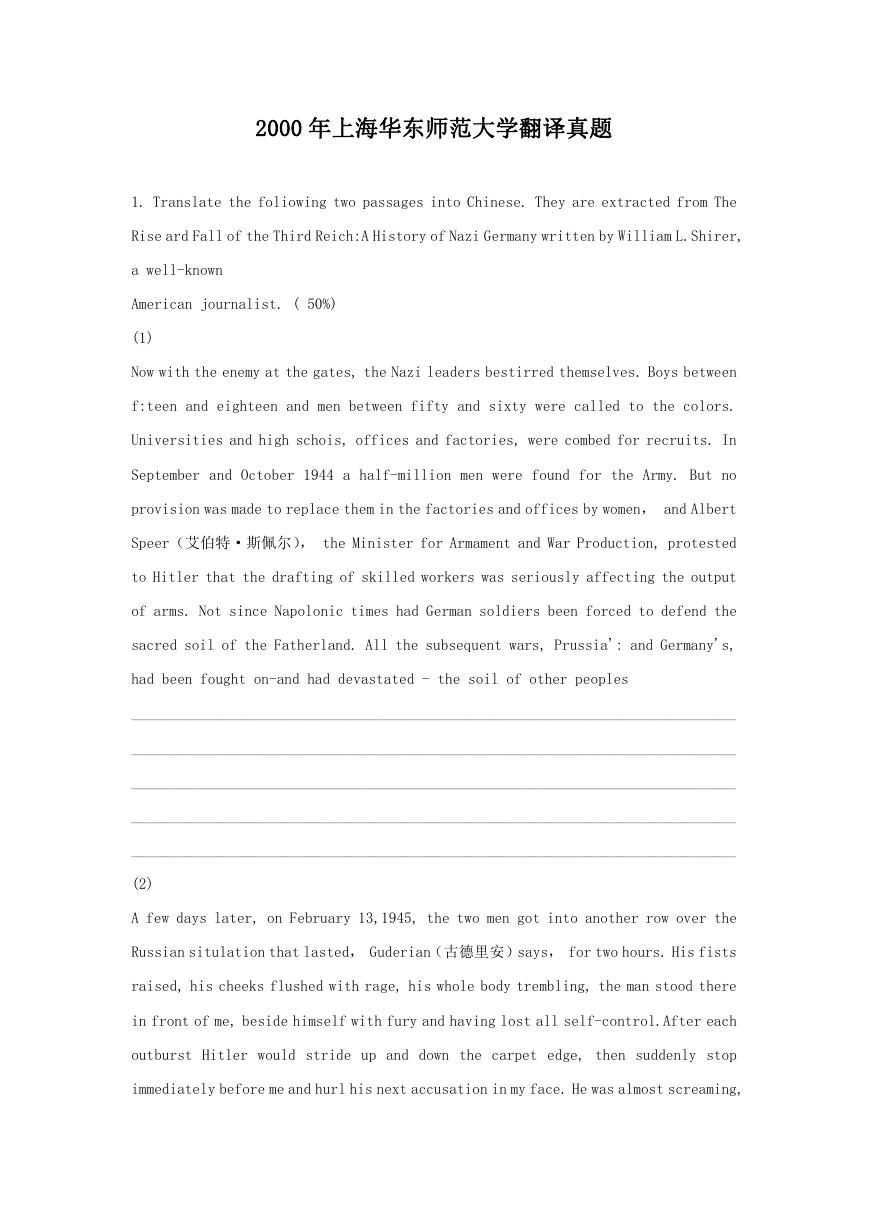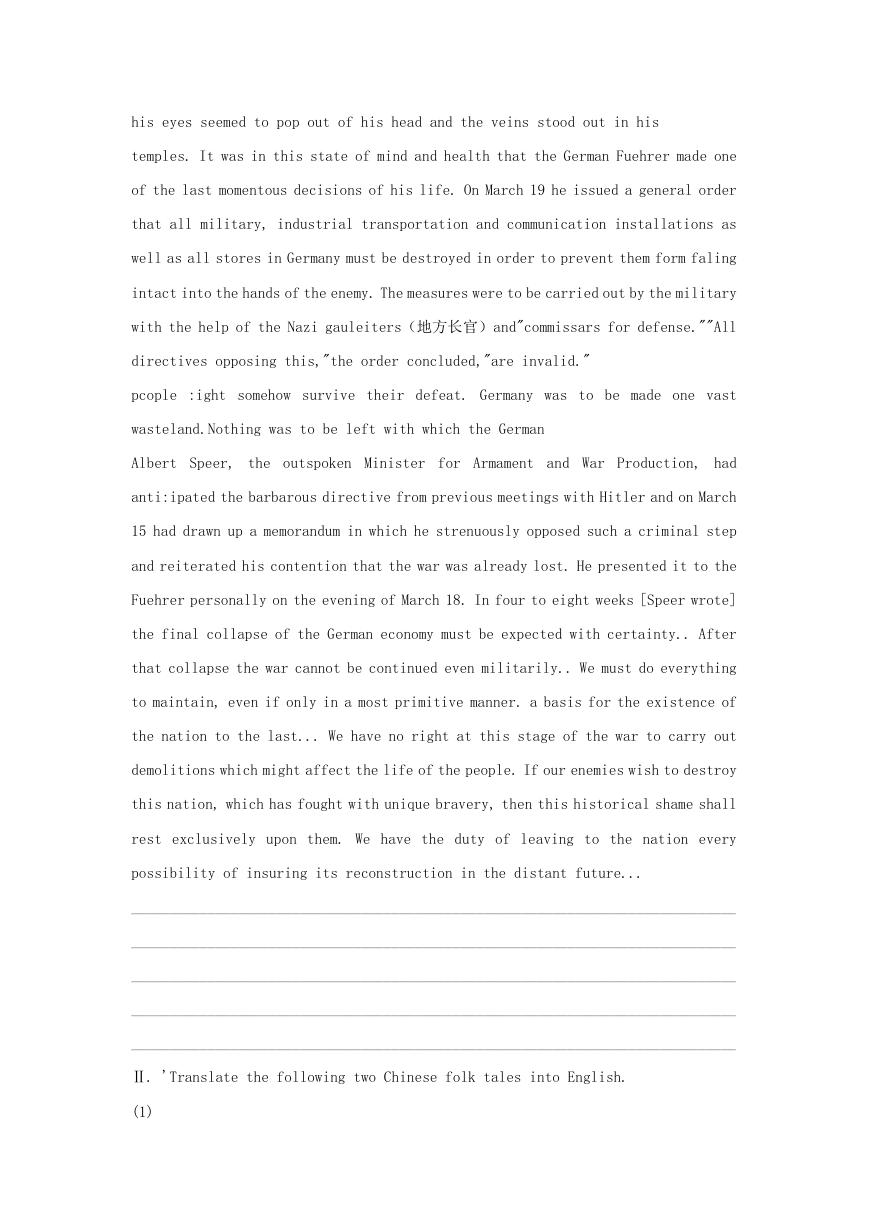2000 年上海华东师范大学翻译真题
1. Translate the foliowing two passages into Chinese. They are extracted from The
Rise ard Fall of the Third Reich:A History of Nazi Germany written by William L.Shirer,
a well-known
American journalist. ( 50%)
(1)
Now with the enemy at the gates, the Nazi leaders bestirred themselves. Boys between
f:teen and eighteen and men between fifty and sixty were called to the colors.
Universities and high schois, offices and factories, were combed for recruits. In
September and October 1944 a half-million men were found for the Army. But no
provision was made to replace them in the factories and offices by women, and Albert
Speer(艾伯特·斯佩尔), the Minister for Armament and War Production, protested
to Hitler that the drafting of skilled workers was seriously affecting the output
of arms. Not since Napolonic times had German soldiers been forced to defend the
sacred soil of the Fatherland. All the subsequent wars, Prussia': and Germany's,
had been fought on-and had devastated - the soil of other peoples
_______________________________________________________________________________
_______________________________________________________________________________
_______________________________________________________________________________
_______________________________________________________________________________
_______________________________________________________________________________
(2)
A few days later, on February 13,1945, the two men got into another row over the
Russian situlation that lasted, Guderian(古德里安)says, for two hours. His fists
raised, his cheeks flushed with rage, his whole body trembling, the man stood there
in front of me, beside himself with fury and having lost all self-control.After each
outburst Hitler would stride up and down the carpet edge, then suddenly stop
immediately before me and hurl his next accusation in my face. He was almost screaming,
�
his eyes seemed to pop out of his head and the veins stood out in his
temples. It was in this state of mind and health that the German Fuehrer made one
of the last momentous decisions of his life. On March 19 he issued a general order
that all military, industrial transportation and communication installations as
well as all stores in Germany must be destroyed in order to prevent them form faling
intact into the hands of the enemy. The measures were to be carried out by the military
with the help of the Nazi gauleiters(地方长官)and"commissars for defense.""All
directives opposing this,"the order concluded,"are invalid."
pcople :ight somehow survive their defeat. Germany was to be made one vast
wasteland.Nothing was to be left with which the German
Albert Speer, the outspoken Minister for Armament and War Production, had
anti:ipated the barbarous directive from previous meetings with Hitler and on March
15 had drawn up a memorandum in which he strenuously opposed such a criminal step
and reiterated his contention that the war was already lost. He presented it to the
Fuehrer personally on the evening of March 18. In four to eight weeks [Speer wrote]
the final collapse of the German economy must be expected with certainty.. After
that collapse the war cannot be continued even militarily.. We must do everything
to maintain, even if only in a most primitive manner. a basis for the existence of
the nation to the last... We have no right at this stage of the war to carry out
demolitions which might affect the life of the people. If our enemies wish to destroy
this nation, which has fought with unique bravery, then this historical shame shall
rest exclusively upon them. We have the duty of leaving to the nation every
possibility of insuring its reconstruction in the distant future...
_______________________________________________________________________________
_______________________________________________________________________________
_______________________________________________________________________________
_______________________________________________________________________________
_______________________________________________________________________________
Ⅱ. 'Translate the following two Chinese folk tales into English.
(1)
�
愈人买鞋
从前有个愚人,想到集市去替自己买双鞋子,他便把脚量好了尺寸,摘根稻杆记作尺码。 可
是因为急于赶路,走时却把那根稻杆忘记带去。 他到了市场,找不到尺码,很懊丧地责备
自己的粗鲁和健忘。为了要知道鞋子的尺寸, 他又急忙地赶回家去。 他在家里找到了那稻
杆尺码,又匆忙地赶到集市。可是集市离家很远,-来一去整整化 了半天,等他赶到市场,
天已黑了,集市已经结束,依旧未买到鞋子。他空手同家,心里 很懊丧。那时有人问他∶"
你替谁买鞋子?是自己买还是替别人买?"愚人回答说∶"替自己买 的啊!"那人义问他∶"那么
你的脚不是在你的身上吗?何必另要带尺码呢?"
_______________________________________________________________________________
_______________________________________________________________________________
_______________________________________________________________________________
_______________________________________________________________________________
_______________________________________________________________________________
(2)
曹冲称象
三国(the"Three Kingdoms")时代曹操(Cao Cao)的第三个儿子曹冲(Cao Chong),天资
聪明绝伦、他年纪不到十岁,就能写出华丽的文章。因此曹操对他非常疼爱。 一天,孙权
(Sun Quan)送给曾操一头大象,曹操很想道这大象的重量, 可是当时还 没有巨秤,可以
用来称它的体重。曹操手下的文武白官想了多时,都面面相觑,毫无办法, 当时曹冲年龄
还未满十岁,就对他父亲说∶"这并不困难,我们可以先把象引到-只空船上 去,用刀刻下
船旁的水痕线,第二步把象牵走,再将碎石子一担(picul--a unit of weight used in many
countries in southeast Asia)一担地挑进船里,船身渐渐下沉,沉到水痕线的地方, 那
石子的重量,就是象的重量了。" 曹操和文武百官听了这个绝妙的方法,大家都惊叹曹冲的
智慧,真是了不起啊!
_______________________________________________________________________________
_______________________________________________________________________________
_______________________________________________________________________________
_______________________________________________________________________________
_______________________________________________________________________________
�






 2023年江西萍乡中考道德与法治真题及答案.doc
2023年江西萍乡中考道德与法治真题及答案.doc 2012年重庆南川中考生物真题及答案.doc
2012年重庆南川中考生物真题及答案.doc 2013年江西师范大学地理学综合及文艺理论基础考研真题.doc
2013年江西师范大学地理学综合及文艺理论基础考研真题.doc 2020年四川甘孜小升初语文真题及答案I卷.doc
2020年四川甘孜小升初语文真题及答案I卷.doc 2020年注册岩土工程师专业基础考试真题及答案.doc
2020年注册岩土工程师专业基础考试真题及答案.doc 2023-2024学年福建省厦门市九年级上学期数学月考试题及答案.doc
2023-2024学年福建省厦门市九年级上学期数学月考试题及答案.doc 2021-2022学年辽宁省沈阳市大东区九年级上学期语文期末试题及答案.doc
2021-2022学年辽宁省沈阳市大东区九年级上学期语文期末试题及答案.doc 2022-2023学年北京东城区初三第一学期物理期末试卷及答案.doc
2022-2023学年北京东城区初三第一学期物理期末试卷及答案.doc 2018上半年江西教师资格初中地理学科知识与教学能力真题及答案.doc
2018上半年江西教师资格初中地理学科知识与教学能力真题及答案.doc 2012年河北国家公务员申论考试真题及答案-省级.doc
2012年河北国家公务员申论考试真题及答案-省级.doc 2020-2021学年江苏省扬州市江都区邵樊片九年级上学期数学第一次质量检测试题及答案.doc
2020-2021学年江苏省扬州市江都区邵樊片九年级上学期数学第一次质量检测试题及答案.doc 2022下半年黑龙江教师资格证中学综合素质真题及答案.doc
2022下半年黑龙江教师资格证中学综合素质真题及答案.doc